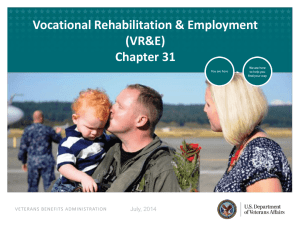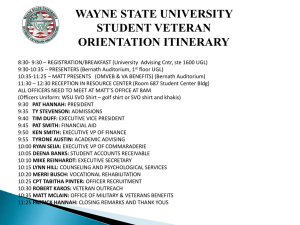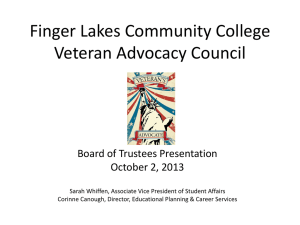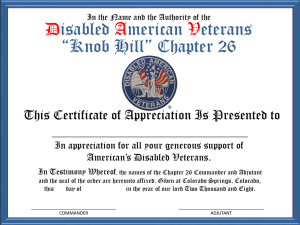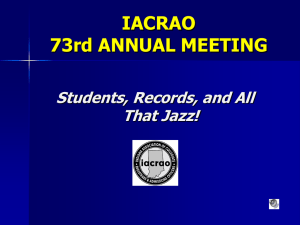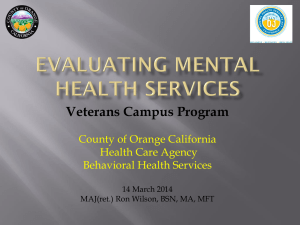Veterans Benefits - Administration and Processing
advertisement
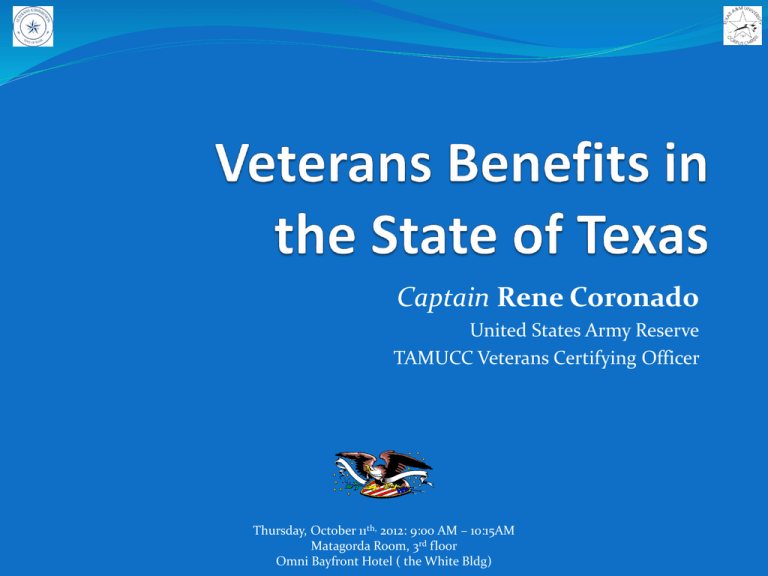
Captain Rene Coronado United States Army Reserve TAMUCC Veterans Certifying Officer Thursday, October 11th, 2012: 9:00 AM – 10:15AM Matagorda Room, 3rd floor Omni Bayfront Hotel ( the White Bldg) Table of Contents Veteran Status Veteran Waivers and Residency Federal Benefits GI Bill Programs Tuition Assistance State Benefits Hazlewood Helping Veteran Students Apply for Benefits Transition from Military to College Life Veterans Office & Veterans Certifying Official Veteran Status Different types of Students claiming Veterans Status and using Veterans Benefits: • Active Duty Service Members – Soldiers, Sailors, Airmen, Marines, and Coast Guardsmen! • Active Reserve Member – Army and Air National Guard, Army/Navy/AF/Marine Reserve! • Veterans – Former members of the active federal service and former members of the active reserve! • Veterans Dependents – Spouses and children (including adopted or step-children) of Veterans who qualify for Veterans Benefits! • Inactive Ready Reserve (IRR) – inactive members of the reserve services, no longer actively serving who may qualify for benefits based on past service (but not on their IRR service) Veteran Status FAFSA, Independent Student and Veterans! Dependent vs. Independent under FAFSA Veteran of Active Federal Service Provides proof in the form of DD Form 214 Discharge Form Does NOT include members of the Active Reserve or National Guard • GI Bill is not based on Dependent vs Independent • Benefit is based on service (Veterans service) • Student must qualify as determined by the Dept. of VA • Tuition Assistance is based on current service (Active or Reserve) Veteran Waivers and Residency Residency Issues with Veterans and Dependents Active Duty Stationed in Texas Must be on Active Federal Service with Orders assigned to Texas Provides proof of Military Status Does NOT include members of the Active Reserve or National Guard • Residency Waivers for Veterans & Dependents Using the GI Bill • • • • Must qualify for the GI Bill Must submit a waiver request form (available on www.CollegeforallTexans.com ) Must plan on making Texas their home of residency. Final determination made by the residency determination official at each school! Chapter 33, Title 38 United States Code Post 9/11 GI Bill Eligibility An individual who served on active duty after 09/10/01 may be eligible for the Post 9/11 GI Bill if the individual Served for an aggregate period of at least 90 days. Exception: An individual discharged due to a service- connected disability after serving at least 30 continuous days on active duty after 9/10/01, may also be eligible. Generally, individuals will remain eligible for benefits for 15 years from: • • Date of last discharge: or Release from active duty service of at least 90 continuous days. If eligibility is based on aggregate service of less than 90 continuous days, individuals will have 15 years from the last period of service used to meet the minimum service requirements for eligibility. • Up to 100% of the cost of tuition and fees at the in-state rate at public institutions (based on what the Veteran qualifies for) paid directly to the school • Private or Foreign School Up to $18,077.50 per academic year National Maximum (formerly $17,500 for 2011-12) • Monthly housing allowance equal to the basic allowance for housing payable to a military E-5 with dependents, in the same zip code as your school (paid to student) • Yearly books and supplies stipend of up to $1000 per year • A one-time payment of $500 paid to certain individuals relocating from highly rural areas What does the Post 9/11 GI Bill Cover? Approved training under the Post 9/11 GI Bill includes graduate and undergraduate degrees, vocational/technical training, on-the-job training, flight training, correspondence training, licensing, and national testing programs, and tutorial assistance. All training programs must be approved for GI Bill benefits by the State Approving Agency – the Texas Veterans Commission! Recent Changes To The Post 9/11 GI Bill – Effective Fall 2012 For veterans and their transferees-simplifies the tuition and fee rate for those attending a public school and creates a national maximum for those enrolled in a private or foreign school. For Active Duty Members and their transferees-creates a national rate for those active duty members enrolled in a private or foreign school pursuing a degree Allows VA to pay MGIB (chapter 30) and MGIB-SR (chapter 1606) “kickers”, or college fund payments, on a monthly basis instead of a lump sum at the beginning of the term Prorates housing allowance by the student’s rate of pursuit (rounded to the nearest tenth) Break or interval pay is no longer payable under any VA education benefit program unless under an Executive Order of the President or due to an emergency, such as a natural disaster or strike. Allows reimbursement for more than one “license or certification” test Recent Changes Continued….. Allows those who are eligible for both Vocational Rehabilitation and Employment (chapter 31) benefits and Post 9/11 GI Bill (chapter 33) benefits to choose the Post 9/11 GI Bill’s monthly housing allowance instead of the chapter 31 substance allowance NOAA and PHS personnel are now eligible to transfer their entitlement to eligible dependents Effective October 1,2011 Allows students to use Post 9/11 GI Bill for • • • • Non-college degree (NCD) programs On-the-job and apprenticeship training Flight programs Correspondence training Housing allowance is now payable to students (other than those on active duty) enrolled solely in distance learning. The housing allowance payable is equal to ½ the national average BAH for an E-5 with dependents Allows students on active duty to receive a books and supplies stipend Transfer of Entitlement If a service member was a member of the Armed Forces on August 1,2009, the Department of Defense (DoD) may offer them the opportunity to transfer benefits to their spouse or dependent children. Service members must transfer benefits before they separate from the service. Service members should contact their service branch for more information. When visiting http://www.gibill.va.gov/benefits/post_911_gibill/transfer_of_bene fits.html website a link is available to take you to the DoD website for more information. Montgomery GI Bill – Chap 30 Vocational Rehabilitation Program (Voc Rehab) – Chap 31 Dependent Education Assistance (DEA) – Chap 35 Reserve GI Bill – Chap 1606 Reserve Education Assistance Program (REAP) – Chap 1607 Other GI Bill Programs Montgomery GI Bill – Chap 30: The ‘Old’ GI Bill which pays students a regular monthly stipend to attend college, university, or certain training; amount is based on school attendance rate (full-time, ¾ time, half-time, ¼ time, etc). For service members and veterans; not transferrable to dependents. Vocational Rehabilitation Program (Voc Rehab) – Chap 31: For disabled Veterans who have a rating of 20% or more, they can apply for the Voc Rehab Program. This program provides assistance preparing Veterans for a career with training or education benefits, similar to the Post-9/11 GI Bill. For disabled veterans only! Dependent Education Assistance (DEA) – Chap 35: This benefit allows the dependents of 100% disabled or deceased Veterans (due to military reasons) an education benefit to attend school. It provides a monthly stipend for up to 48 months. For dependents only! Reserve GI Bill – Chap 1606: This benefits provides a monthly stipend for active reserve members of the Reserve or National Guard. Service members must be in good standing with their reserve unit to receive benefits. For Reserve and National Guard service members only! Reserve Education Assistance Program (REAP) – Chap 1607: Prior to the Post9/11 GI Bill, US Gov’t established the REAP Program for Reserve and National Guard service members who were activated and deployed to Iraq or Afghanistan. This benefit pays a monthly stipend similar to the MGIB-AD, but at a reduced rate. Department of Defense Education Assistance Programs Tuition Assistance (TA) Program Overview The Armed Forces offers soldiers, sailors, marines, guardsman, and airmen several programs to support their education goals including up to 100% Tuition Assistance for college courses taken during off-duty Armed Forces Tuition Assistance (TA) is a benefit paid to eligible members of the Army, Navy, Marines, Air Force, and Coast Guard. Congress has given each service the ability to pay up to 100% for the tuition expenses of its members. Each service has its own criteria for eligibility, obligated service, application process' and restrictions. This money is usually paid directly to the institution by the individual services. Additionally active duty members may elect to use the MGIB "top-up" in addition to their service provided TA to cover high cost courses. TA is not a loan; it should be viewed as money you have earned just like your base pay. Maximum amount of $4500 per academic year (different by service) Must pass all classes and maintain satisfactory academic progress to receive benefit Must currently be serving in the Active or Reserve Service to receive benefit; not for Veterans Tuition and some fees paid directly to the school, not the student All Army, Army Reserve and Army National Guard must use: www.GoArmyEd.com website For more information go to: http://www.military.com/education/money-for-school/tuitionassistance-ta-program-overview.html State Benefits: Hazlewood Purpose To encourage Texas Veterans and family members to pursue higher education by providing an exemption from payment of tuition and most fees to eligible Texas Veterans and their eligible dependent children and spouses. Hazlewood Act Provides exemptions from tuition, dues, most fees and other required charges for up to150 credit hours. Applies to Public Institutions of Higher Education in Texas At – – – time of entry into service, member must: be a Resident of Texas, or Entered the service in the State of Texas, or Declared Texas as his or her home of record in the manner provided by the military or other service at time of entry Was honorably discharged from service (Honorable or General, Under Honorable Conditions discharge) Served more than 180 days of active duty excluding training of active federal service. Is not default on an education loan made or guaranteed by the State of Texas Currently a resident and resides in the state of Texas (S.B. 639 effective 6/17/11) Hazlewood Act (Cont.) Under some circumstances it is possible to receive the Hazlewood Act benefit and federal VA education benefits concurrently. If the student is receiving federal VA education benefits under Chapter 30, 35, 1607 or 1607, or Chapter 33 at less than the 100% rate, they may receive the Hazlewood exemption and their federal education benefit concurrently. Stacking A student may use both Chapter 33 (if less than the 100% rate) and Hazlewood during the same term if the combination of benefits does not exceed the total amount of tuition and fees. A student who is eligible for federal education benefits under Chapter 33 or 31 may NOT decline his/her federal education benefit and still receive Hazlewood. If the veteran is eligible for federal education benefits, they must use these benefits as long as they are available. Hazlewood for Dependents Children and spouses(as of the Fall 2009 school term) of service members who were killed or die in the line of duty are missing in action, who die as a result of injury or illness directly related to military service, or who became totally disabled for purposes of employability as a result of a service-related injury or illness are eligible for Hazlewood Act benefits provided (1) the child must have been a dependent of the eligible service member when the member died, sustained the disabling injury or when the service member was declared to be 100% unemployable by the VA. Beginning Fall 2011 an eligible child must be 25 years or younger on the first day of the school term. (2) the spouse or child must be able to provide official documentation from the VA indicating that the service member has a 100% unemployable rating, if applicable (3) the spouse must provide proof that he/she was the legal spouse of the eligible service member at the time the service member died, sustained his/her disabling injury, or was classified as missing in action. Hazlewood Legacy Allows eligible veteran to assign unused hours to a child; The veteran must be a resident and reside in Texas in order to transfer unused hours to the child Only one child at a time can use the exemption Child must be: Member’s stepchild, biological child, adopted child or claimed as dependent (previous or current year); a resident of Texas Be 25 years or younger on the first day of the semester ; and Meet satisfactory academic progress. New Hazlewood Law: S.B. 639 Allows children of deceased eligible veterans to have unused Hazlewood hours assigned to them by the deceased veteran’s spouse or by the conservator, guardian, custodian, or other legally designated caretaker of the child. Fry Scholarship Effective August 1, 2009 Provides education benefit eligibility for children of active duty members of the Armed Forces who died in the line of duty after September 10, 2001. An information sheet about the Fry Scholarship is available at: http://www.gibill.va.gov/documents/factsheets/fry_scholars hip.pdf Eligible children: • May be married or over 23 and still be eligible • Are entitled to 36 months of benefits at the 100% level • Have 15 years to use the benefit beginning on their 18th birthday • May use the benefit until their 33rd birthday • Are not eligible for the Yellow Ribbon Program Helping Veteran Students Apply for Benefits How Do They Apply? Students can go to the GI Bill Website and apply online! Get help from your school’s VA Certifying Official! http://www.gibill.va.gov/ GI Bill Hotline: 1-888-442-4551 Helping Veteran Students Apply for Benefits How Do They Apply? Students should provide a certified copy of their DD Form 214 Member 2 or 4 Copy and a completed HE-V and HE-D form (and all other requested documents) to their school’s Hazlewood official before the end of the semester to use the benefit. http://www.collegeforalltexans.com/apps/financialaid/tofa2.cfm?I D=579 Texas Veterans Commission Hotline: 512/ 463-5538 Transition from Military to College Life How to help Veterans transition from combat to the classroom… Service members and Veterans have a very hard time with the bureaucracy and paperwork involved in getting started in college life. They get frustrated quickly with half-answers to specific questions and being told to go somewhere else for assistance. Veterans work well when given specific answers and assistance and can do well when following steps or a checklist. We offer two versions of our checklist at Texas A&M University – Corpus Christi to help guide our Veterans through the process. Have all the information on one list or on one website helps: Veterans Online Guide: http://vets.tamucc.edu/certification.php Veterans Online Checklist: http://vets.tamucc.edu/PDF/Veterans_Checklist.pdf TAMUCC Veterans Office Office Phone: 361-825-2331 Veterans Office & Veterans Certifying Official All schools approved for receipt of the GI Bill have a VA Certifying Official designated by the school to process and submit all certification for benefits under the GI Bill. Some schools located close to a military installation or with large Veteran populations have a dedicated Veterans Office to assistant service members, Veterans, and their dependents in applying for and processing claims for VA Education Benefits. In some schools this office is also responsible for the Hazlewood Program and the VA Certifying Official is also the Hazlewood determination official for the school. Having one central location for these services helps the Veterans to complete all their applications for various benefits and ask questions at ‘one-stop shop.’ A few school dedicated to providing extra services to Veterans have established Veterans Transitions Centers, some using federal or private grants. These centers provide veterans extra help and a place to access the internet, consult with fellow Veterans and counselors, and work with the schools Veterans Office. The Dept of Education also has a Federal Grant for schools to establish a Veterans Upward Bound Program. Currently only one school has a Veterans Upward Bound Program: UT Brownville. TAMUCC Veterans Office Office Phone: 361-825-2331 Last minute notes on Veterans: It’s recommended (but not required) to hire or have a Veteran as your VA Certifying Official or as part of the Veteran Office Staff The Dept. of Veterans Affairs requires that Veterans be treated like all other students The burden of proof on qualifying for benefits is on the student Not all Veterans have or use their benefits Veterans may choose to not identify themselves as Veterans for various reasons Veterans with difficulty with classes, professors, or fellow students should be directed to VA counseling services, campus counseling services, or Veteran peer groups whenever possible; Disability services can help! Students who drop classes or withdraw must pay back money to VA; no 60% completion rule with VA If you every have any questions you can contact the Texas Veterans Commission for assistance Questions?

